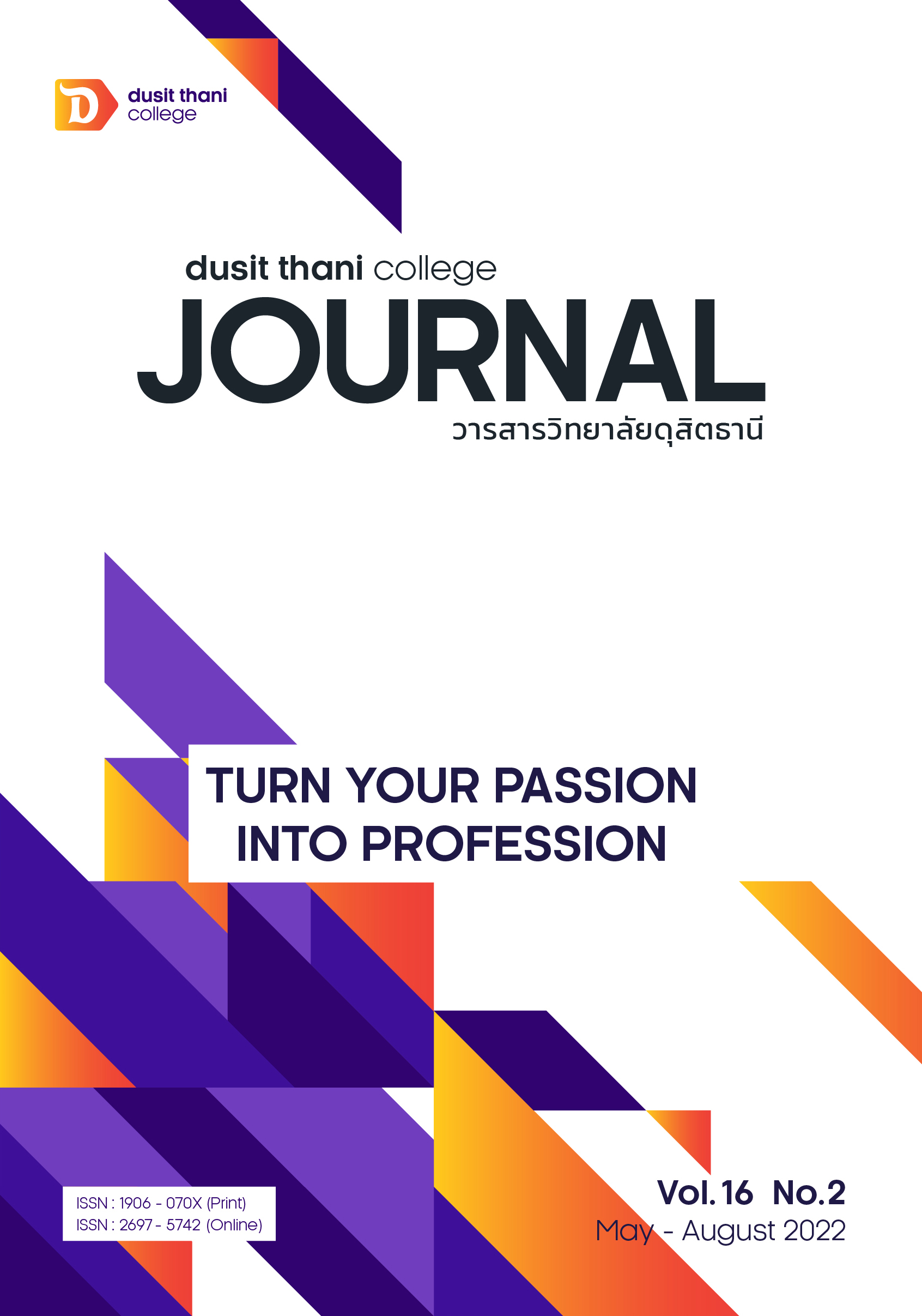Generation Y Consumers’ Need of Food Delivery Service Application after the Coronavirus Disease 2019 (COVID-19) Pandemic in Bangkok
Main Article Content
Abstract
The objectives of this research were 1) to study Generation Y consumers’ behavior in using food delivery service application in Bangkok, and 2) to study Generation Y consumers’ needs of 7Ps marketing mix in using food delivery service application after the Coronavirus Disease 2019 (COVID-19) pandemic in Bangkok. Quantitative research was employed. The data were collected by using a questionnaire of 420 Generation Y consumers in Bangkok who used food delivery services applications. Data were analyzed by using descriptive statistics: frequency, percentage, mean, and standard deviation.
The results showed that the majority of Generation Y consumers who used food delivery service applications were females, between the age of 34-39 years old, single, and graduated with a bachelor's degree. They worked in the private sector with a monthly income of 20,000 Baht or less, and mostly lived with 3-4 family members. Grab Application was the most frequently used. The factors that encouraged the use of food delivery service applications included a variety of restaurants showed on the applications and the restrictions and inconveniences in eating out during the COVID-19 pandemic. The popular choice of food ordered was Thai fast food with an average cost of 300 Baht per order or lower. The payment was usually made in cash. The ordering frequency through an application was 1-3 times per week, usually for lunch on the weekdays. The maximum acceptable wait time was reported not to exceed 30 minutes. Most consumers had positive feedback regarding delivery speed and tended to return to use the service continuously. After the COVID-19 pandemic, the overall Generation Y consumers' need of 7Ps marketing mix was found to be at the highest level.
Article Details

This work is licensed under a Creative Commons Attribution-NonCommercial-NoDerivatives 4.0 International License.
Article Screening Policy
- All research and academic articles to be published must be considered and screened by three peer reviews in the relevant field / article.
- All articles, texts, illustrations and tables published in the journal are the personal opinions of the authors. Editors don't always have to agree. And no responsibility whatsoever is the sole responsibility of the author.
- The articles to be published must never be published. Where did you first publish? And not in the consideration of other journals If the audit found that there has been a duplicate publication It is the sole responsibility of the author.
- Any article that the reader sees as being plagiarized or impersonated without reference. Or mislead the work of the author Please let the journal editor know it will be your greatest blessing.
References
Boonrod, A. (2020). Media usage behavior of Thai people after COVID-19. Retrieved from https://www.bangkokbiznews.com/blog/detail/650398.
Chalermdan, N. (2021). Consumers’ Behavior on Buying Delivery Food Via Mobile Application During New Species of Corona Virus 2019 (COVID-19) in Bangkok. Journal of Industrial Business Administration, 2(1), 91-106.
Department of Disease Control. (2019). What is the 2019 novel coronavirus?. Retrieved from https://ddc.moph.go.th/viralpneumonia/faq_more.php
Electronic Transactions Development Agency. (2020). ETDA reveals that Gen-Y people order the most food online and over 40% order because of fear of covid-19. Retrieved from https://www.etda.or.th/th/newsevents/pr-news/
Jitsoonthornchaikul, M. (2018). Consumer behavior and retail business. Bangkok: Se-Education.
Kasikorn Research Center. (2020). After COVID-19, food delivery business expands on intense competition...Platform Service Providers Advance into Super Application. Trends, 26(3128), 1-6.
Klaengkla, P. (2019). An Analysis On Optimal Attributes Of Food Delivery Application In Bangkok. Independent research. Master of Science, Kasetsart University.
Lakphanphakdee, C. (2017). Factors Affecting Purchase Decision for Food Ordered Online in The Bangkok Metropolitan Area. Independent research. Master Of Business Administration, Thammasat University.
Mahapornprachak, T. (2020). Adjust the business to survive in the New Normal. Retrieved from https://www.bot.or.th/Thai/ResearchAndPublications/articles/Pages/Article_19Oct2020.aspx.
Ministry of Digital Economy and Society. (2020). Report of the survey results of internet users in Thailand for the year 2020. [electronic media]. Electronic Transactions Development Agency, 1-125.
National Statistical Office. (2019). Population in Bangkok Metropolitan Region and the whole Kingdom, 2004 - 2019 and projections for 2020 - 2023. Retrieved from http://statbbi.nso.go.th/staticreport/page/sector /th/01.aspx
Riengsinchai, J. (2020). Study of food service order behavior through the application Of consumers in Bangkok: Application Lineman, Foodpanda, Grabfood. SSRU Journal of Public Administration, 3(2), 31-48.
Srichaiya, U. (2017) The marketing mix affecting decision of using service fitness center of private higher education institution in Bangkok Metropolitan. Master of science thesis, Chulalongkorn University.
Sangthongjai, S. & Taiphapoon, T. (2018). The Influence of Marketing Mix Factors on Thai Digital Natives Decision Behavior towards Food Delivery Application in Bangkok. Journal of Public Relations and Advertising, 12(1), 13-31.
Udomtanateera, K. (2018). Maslow's Hierarchy of Need. Retrieved from https://www.iok2u.com/index.php/article/11-marketing/263-maslow-s-hierarchy-of-need-maslow


